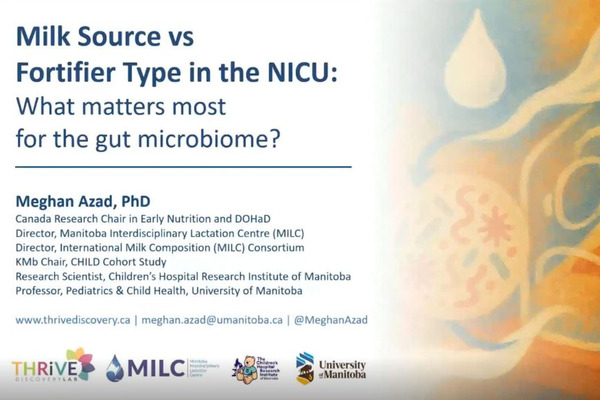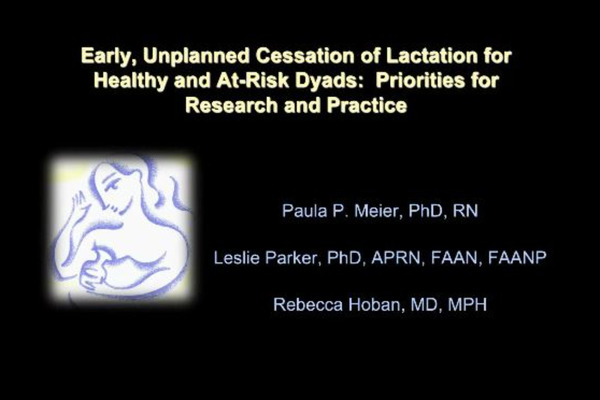
Ce module d'apprentissage met en évidence l’urgence d’améliorer la prise en charge des mères confrontées à des difficultés qui entravent le démarrage de la lactation. S'appuyant sur les conclusions de deux publications récentes, il propose des conseils fondés sur des données probantes afin de soutenir ces « mères invisibles » souvent négligées et améliorer les résultats en matière d'allaitement grâce à des stratégies de soins ciblées et empreintes de compassion. Read more

Dieses E-Learning-Modul unterstreicht die Notwendigkeit, Frauen mit Risikofaktoren für die Laktation zu erkennen und den herausfordernden Stillbeginn bestmöglich zu unterstützen. Auf der Grundlage von Erkenntnissen aus zwei aktuellen Publikationen bietet es evidenzbasierte Leitlinien zur Unterstützung dieser oft "übersehenen" Mütter. Fokusiert werden verbesserte Stillergebnisse durch gezielte, einfühlsame Betreuungsstrategien. Read more

The gut microbiome and gut inflammation are central to health outcomes in very low birthweight preterm infants. In the NICU, both milk source and fortifier type are important feeding decisions, but their relative influence on these parameters is not well studied. This presentation by Meghan Azad will review new evidence showing that milk source (mother’s own vs donor milk) is more strongly associated with microbiome composition, gut inflammation, and growth than fortifier type (human- vs bovine-derived). Participants will come away with a clearer understanding of how these findings can inform NICU feeding practices and support evidence-based counseling for families. Read more

This foundational e-learning bundle, comprising of 4 modules, provides healthcare professionals with a structured understanding of lactation science, strategies for proactive lactation support and best practices for supporting mothers and infants in the Neonatal Intensive Care Unit (NICU). Four foundational modules: Anatomy & Physiology of Lactation: Explore the structure and function of the lactating breast and how milk is effectively removed during breastfeeding. Colostrum Science: Understand the unique composition and role of colostrum in supporting extrauterine life and its clinical benefits for vulnerable infants. Proactive Lactation Support: Best practices for early lactation support and proactive volume-building strategies for women and infants who are at-risk of early cessation of breastfeeding Best practices for lactation initiation and coming to volume in the NICU: Learn evidence-based strategies to initiate lactation, build milk volume, and overcome barriers faced by mothers in the NICU—ensuring every infant receives the lifelong benefits of mother’s own milk (MOM). Drawing on recent research and compassionate care principles, these courses empowers healthcare providers to improve outcomes for preterm and critically ill infants through targeted, proactive lactation support. Courses are accredited and include clinical competencies, white papers, infographics to download. Read more

Why do racial and structural disparities still shape breastfeeding outcomes—and what can we do to change that? Learn how equity-focused strategies and evidence-based models can transform neonatal care and breastfeeding outcomes. This bundle features leading experts sharing practical approaches to reduce disparities and empower informed family decisions. Speakers & Topics: Rose Horton, MSM, RNC-OB, NEA-BC, FAAN Using Equity as a Lens in Quality Improvement – Nurses’ role in mitigating NICU disparities. Dr. Diane Spatz & Stephanie Acquaye Black women do breastfeed beyond a year– Understanding racial disparities and strategies for improvement. Dr. Diane Spatz– A proven framework for equitable breastfeeding support. Informed Decision Making for Human Milk - implicit bias and structural racism on families breastfeeding experiences. Read more

Early, unplanned cessation of lactation is common among mothers delivering both term and preterm infants, with low volume cited as a primary etiology. In this webinar, Prof. Paula Meier, Dr. Leslie Parker and Dr. Rebecca Hoban highlight new data from a special edition of Breastfeeding Medicine focused on this important topic. The webinar will target the underlying biologic risks to the achievement of secretory activation and the upregulation of autocrine/paracrine control of milk synthesis and secretion-- often overlooked in strategies calling for additional “support”. These achievements incur maternal opportunity costs, and are exacerbated in mothers with complications of pregnancy and birth. Early postpartum mammary gland stimulation and effective and efficient milk removal strategies that optimize long-term milk volume in both populations will be emphasized. Also included will be the utility of point-of-care techniques to identify and mitigate early lactation risks for mothers of both healthy and at-risk infants. The overall focus of the webinar is to equip front-line lactation care providers with data-driven tools and messaging for families in their care. You can watch the webinar video in your preferred language by selecting the CC option and choosing your desired language from the settings menu on the presentation page. Read more
Shopping Cart
Your cart is empty
